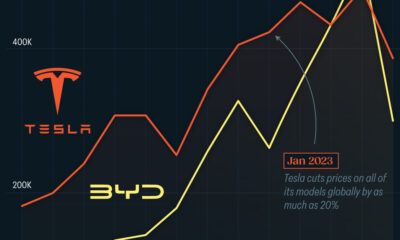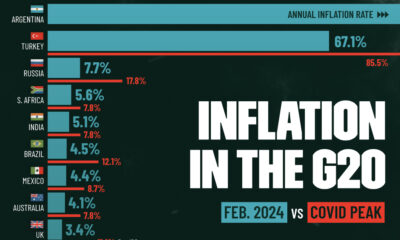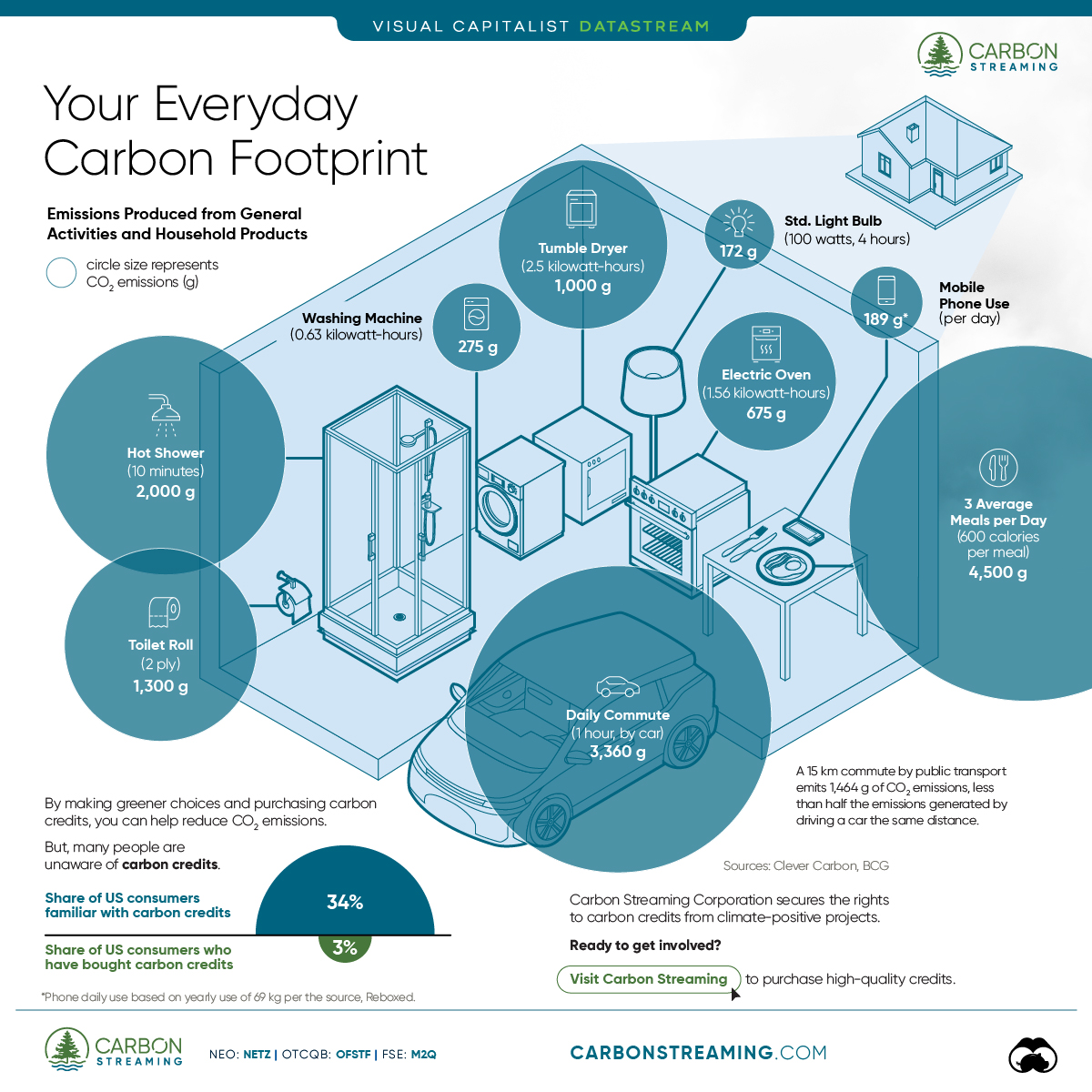Datastream
The Rich Got Richer During COVID-19. Here’s How American Billionaires Performed

The Briefing
- In year defined by a global pandemic, many of the wealthiest people in the U.S. saw their wealth grow substantially
- Since the market bottom in March 2020, the billionaires on this list grew their wealth by 57% on average
- Elon Musk had the highest net worth increase at $128.9 billion
How American Billionaire Wealth Did During COVID-19
We’ve all been affected by the pandemic-induced mayhem of 2020. But when it comes to finances, some have fared far better than others.
While job loss persists for Americans making less than $20 an hour, the rich have gotten richer. More specifically, the most wealthy American billionaires have seen their net worth bounce back dramatically, thanks to strong stock market performance.
Here’s a look at who’s gotten richer since the market bottom in March 2020, and just how much their net worth has increased since then:
Billionaire Net Worth Growth in 2020
Between March’s market bottom and December 2020, the billionaires included on this list grew their wealth by 57% on average. Interestingly, that’s about 10 percentage points higher than the overall growth of the S&P 500 index during the same time period.
| Name | Main Source | Wealth Growth (Mar 18–Dec 21, 2020) | Net worth % Growth (Mar 18– Dec 21, 2020) |
|---|---|---|---|
| Jeff Bezos | Amazon | $73.7 B | 65% |
| Elon Musk | Tesla, SpaceX | $128.9 B | 524% |
| Bill Gates | Microsoft | $ 22.1 B | 23% |
| Mark Zuckerberg | $46.8 B | 86% | |
| Warren Buffett | Berkshire Hathaway | $17.5 B | 26% |
| Larry Ellison | Oracle | $29.5 B | 50% |
| Larry Page | $25.4 B | 50% | |
| Sergey Brin | $25.0 B | 51% | |
| Steve Ballmer | Microsoft | $21.4 B | 41% |
| Alice Walton | Walmart | $13.7 B | 25% |
| Jim Walton | Walmart | $13.3 B | 24% |
| Rob Walton | Walmart | $13.5 B | 25% |
| MacKenzie Scott | Amazon | $20.5 B | 57% |
| Michael Bloomberg | Bloomberg LP | $6.9 B | 14% |
| Phil Knight | Nike | $22.1 B | 75% |
| Total Average | $480.3 B | 57% |
Elon Musk saw the highest increase during this period, with a $129 billion boost in net worth—that’s a whopping 523% in gains.
This makes sense considering the year Musk has had. Tesla’s market value has skyrocketed throughout 2020, and SpaceX’s long term valuation doubled after making some monumental strides in the private space industry.
Jeff Bezos saw the second highest growth in net worth with a $74 billion increase. This isn’t surprising, given that Amazon’s stock price has climbed 69% since the beginning of 2020.
But Amazon hasn’t been the only company to benefit from the accelerated e-commerce market—other retailers, like Nike, have also seen a significant boost in online sales this year as well.
Billionaire Wealth in General is Up
It’s not just the billionaires on this list that have increased their wealth. In fact, during the pandemic, billionaire wealth on average has increased 27% worldwide. Growth has been exceptionally strong in tech and healthcare.
Will things level out post-pandemic, or will the wealth gap continue to grow?
Where does this data come from?
Source: Forbes and Yahoo Finance.
Details: Net worth figures for March 2020 were pulled from Forbes 34th annual List of Global Billionaires. Figures for Dec 2020 were taken from Forbes’ Real Time Billionaires List on Dec 21 2020.
Datastream
Can You Calculate Your Daily Carbon Footprint?
Discover how the average person’s carbon footprint impacts the environment and learn how carbon credits can offset your carbon footprint.
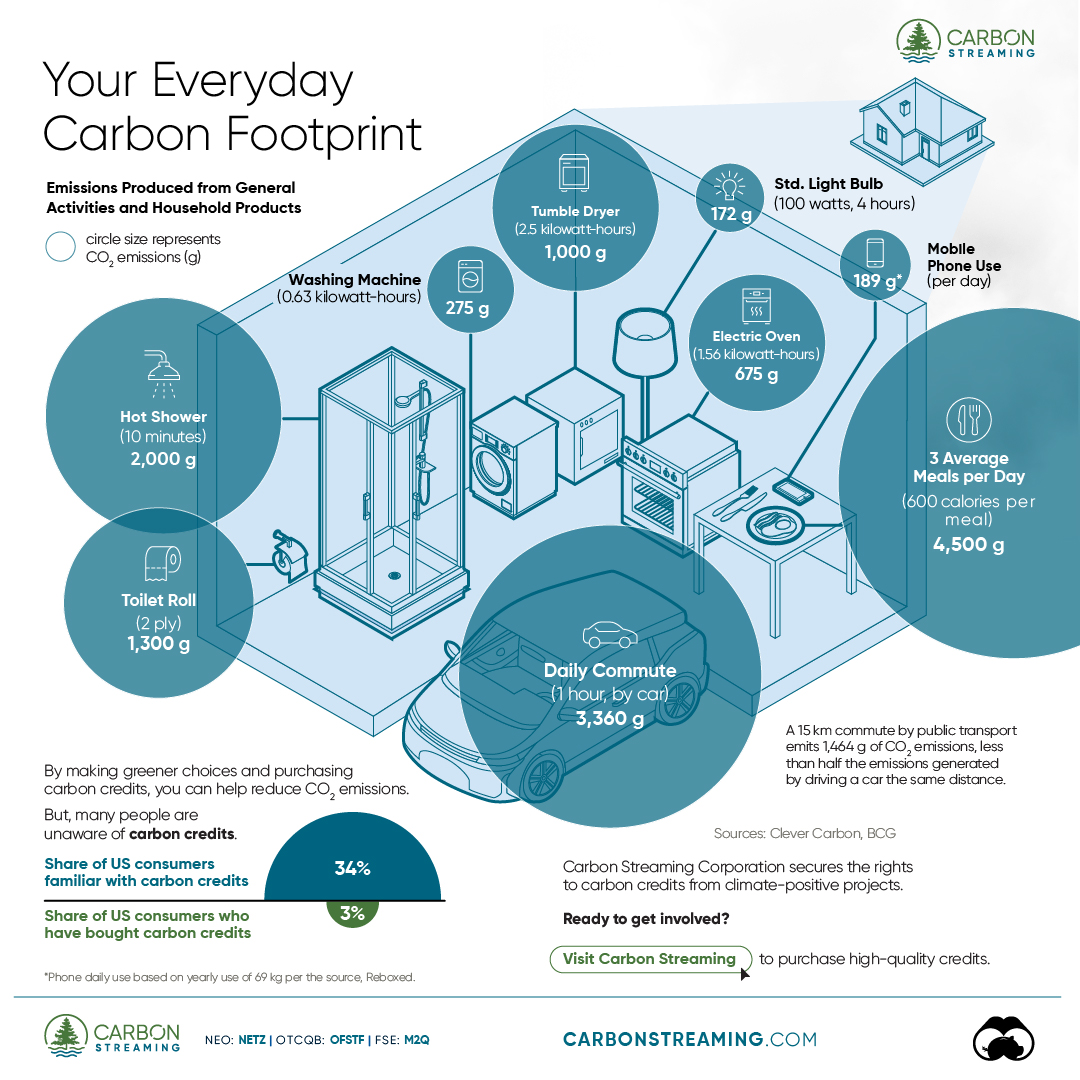
The Briefing
- A person’s carbon footprint is substantial, with activities such as food consumption creating as much as 4,500 g of CO₂ emissions daily.
- By purchasing carbon credits from Carbon Streaming Corporation, you can offset your own emissions and fund positive climate action.
Your Everyday Carbon Footprint
While many large businesses and countries have committed to net-zero goals, it is essential to acknowledge that your everyday activities also contribute to global emissions.
In this graphic, sponsored by Carbon Streaming Corporation, we will explore how the choices we make and the products we use have a profound impact on our carbon footprint.
Carbon Emissions by Activity
Here are some of the daily activities and products of the average person and their carbon footprint, according to Clever Carbon.
| Household Activities & Products | CO2 Emissions (g) |
|---|---|
| 💡 Standard Light Bulb (100 watts, four hours) | 172 g |
| 📱 Mobile Phone Use (195 minutes per day)* | 189 g |
| 👕 Washing Machine (0.63 kWh) | 275 g |
| 🔥 Electric Oven (1.56 kWh) | 675 g |
| ♨️ Tumble Dryer (2.5 kWh) | 1,000 g |
| 🧻 Toilet Roll (2 ply) | 1,300 g |
| 🚿 Hot Shower (10 mins) | 2,000 g |
| 🚙 Daily Commute (one hour, by car) | 3,360 g |
| 🍽️ Average Daily Food Consumption (three meals of 600 calories) | 4,500 g |
| *Phone use based on yearly use of 69kg per the source, Reboxed | |
Your choice of transportation plays a crucial role in determining your carbon footprint. For instance, a 15 km daily commute to work on public transport generates an average of 1,464 g of CO₂ emissions. Compared to 3,360 g—twice the volume for a journey the same length by car.
By opting for more sustainable modes of transport, such as cycling, walking, or public transportation, you can significantly reduce your carbon footprint.
Addressing Your Carbon Footprint
One way to compensate for your emissions is by purchasing high-quality carbon credits.
Carbon credits are used to help fund projects that avoid, reduce or remove CO₂ emissions. This includes nature-based solutions such as reforestation and improved forest management, or technology-based solutions such as the production of biochar and carbon capture and storage (CCS).
While carbon credits offer a potential solution for individuals to help reduce global emissions, public awareness remains a significant challenge. A BCG-Patch survey revealed that only 34% of U.S. consumers are familiar with carbon credits, and only 3% have purchased them in the past.
About Carbon Streaming
By financing the creation or expansion of carbon projects, Carbon Streaming Corporation secures the rights to future carbon credits generated by these sustainable projects. You can then purchase these carbon credits to help fund climate solutions around the world and compensate for your own emissions.
Ready to get involved?
>> Learn more about purchasing carbon credits at Carbon Streaming
-
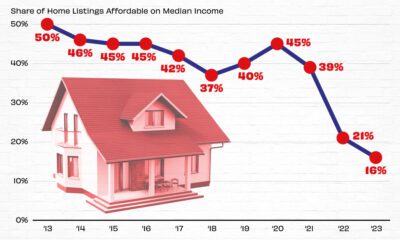
 Markets2 weeks ago
Markets2 weeks agoVisualizing America’s Shortage of Affordable Homes
-

 Technology1 week ago
Technology1 week agoRanked: Semiconductor Companies by Industry Revenue Share
-

 Money1 week ago
Money1 week agoWhich States Have the Highest Minimum Wage in America?
-

 Real Estate1 week ago
Real Estate1 week agoRanked: The Most Valuable Housing Markets in America
-

 Business1 week ago
Business1 week agoCharted: Big Four Market Share by S&P 500 Audits
-
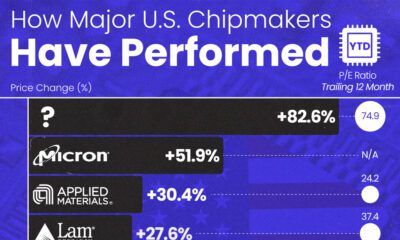
 AI1 week ago
AI1 week agoThe Stock Performance of U.S. Chipmakers So Far in 2024
-

 Misc2 weeks ago
Misc2 weeks agoAlmost Every EV Stock is Down After Q1 2024
-

 Money2 weeks ago
Money2 weeks agoWhere Does One U.S. Tax Dollar Go?


